|
|
|
Sort Order |
|
|
|
Items / Page
|
|
|
|
|
|
|
| Srl | Item |
| 1 |
ID:
123514
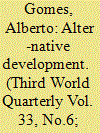

|
|
|
|
|
| Publication |
2012.
|
| Summary/Abstract |
The goal of this article is to outline an indigenous form of social ecology offered as an alternative development model. Based on the normative system of the Orang Asli (Malaysian Aborigines), this model is characterised by various social, cultural and ecological ideas and practices undergirding the interconnected conditions of equality, sustainability and peace, which engenders a better life for all within the community. I contend that this model will provide lessons on how we might develop a normative paradigm to serve as an alternative to the current ecological and socially unsustainable mainstream and neoliberal development policy and practice, obsessed with the attainment of economic growth and greater market integration.
|
|
|
|
|
|
|
|
|
|
|
|
|
|
|
|
| 2 |
ID:
123511
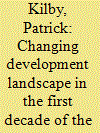

|
|
|
|
|
| Publication |
2012.
|
| Summary/Abstract |
The first decade of the 21st century has been characterised by complex and interrelated changes that have affected development. Development studies as a discipline has traditionally been concerned with the impact of colonisation and neocolonialism, and with neoliberal-related growth models. This paper argues that, since around the turn of the century, there has been a major shift in development, driven by a series of fundamental changes, including the relative failure of the neoliberal project in the 1980s and 1990s, which by the 2000s was partly replaced by a greater concern with addressing security issues with aid; the rise of China and other middle-income countries as large resource providers for development; and the rapid increase of remittance flows to lower and middle income countries. The paper looks at how both development studies and aid policy in Australia and elsewhere have been relatively slow to engage with this rapidly changing context. The big challenges for development studies will be: engaging with developing countries as development donors with different agendas for development; the decline of much of the current neoliberal paradigm; alternative sources of development finance; and the securitisation of Western aid.
|
|
|
|
|
|
|
|
|
|
|
|
|
|
|
|
| 3 |
ID:
123516
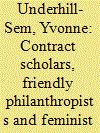

|
|
|
|
|
| Publication |
2012.
|
| Summary/Abstract |
Understanding new actors in development requires a reconsideration of how subjects come to be and how collectivities are formed. This paper works with post-structuralist notions of subjectivities and collectivities as 'series' in three distinct cultural historical geographies to show the subtle ambiguities in contemporary practices of development. Working with Iris Marion Young's conceptualisation of seriality, it provides an Antipodean perspective on the entanglements of contemporary critical geography with new development actors through case studies of indigenous scholars in Te Rarawa in Aotearoa/New Zealand, of contract scholars and a philanthropist in West Bengal and of feminist activist scholars in the Pacific. In doing so, it points to the need to radically rethink participation in development by closely analysing the ways in which the subjects are constituted, and the critical role of visions within development narratives, actions and practice.
|
|
|
|
|
|
|
|
|
|
|
|
|
|
|
|
| 4 |
ID:
123510
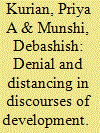

|
|
|
|
|
| Publication |
2012.
|
| Summary/Abstract |
Anxieties about development in New Zealand show up in a deep-rooted fear of the 'Third World' in the country. We examine how the term 'Third World' is deployed in media discourses in economic, social and environmental contexts and how this deployment results in a 'discursive distancing' from anything associated with the 'Third World'. Such distancing demonstrates a fragile national identity that struggles with the contradictions between the nation's desire to be part of the 'First World' of global capitalism and the growing disparities in health and wealth within it. The shadow of the 'Third World' prevents New Zealand from confronting the realities of its own inequities, which in turn comes in the way of a sound development agenda.
|
|
|
|
|
|
|
|
|
|
|
|
|
|
|
|
| 5 |
ID:
123509
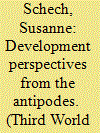

|
|
|
|
|
| Publication |
2012.
|
| Summary/Abstract |
Is there a distinctive Antipodean approach to development? In this introduction I take up Raewyn Connell's challenge to explore the possibilities for knowledge production that reflects Australia's and New Zealand's geographical situation of rich peripheral countries and their history of settler colonisation. While Antipodeans' contributions to development theory have been limited, their work is characterised by close connections between theory and practice. The Antipodes' positioning as global North in the geographical South has stimulated a search for alternative approaches to development knowledge. This is variously pursued through collaborative research relationships with indigenous communities, close engagement with non-Western cultural frameworks, and a focus on marginal spaces and positions. As the centre of global economic power shifts to the South, existing development relationships and established ways of doing development are increasingly challenged by newly constituted subject positions and coalitions.
|
|
|
|
|
|
|
|
|
|
|
|
|
|
|
|
| 6 |
ID:
123517
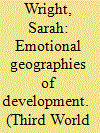

|
|
|
|
|
| Publication |
2012.
|
| Summary/Abstract |
Hope, despair, fear, hate, joy, desire and anger; the social scienceshave increasingly recognised the role of emotions in shaping society, and in defining and transforming people and place. Such concerns have clear implications for the study of development. Emotions help create development subjects and define subjectivities. They are imbricated in the production of exclusions and colonialisms yet they can also empower resistance and progressive change. In short, they are intimately bound up with the way development functions in all its messiness. In this paper I begin to explore the generative role of emotions in the discourses and practices of development. I draw on empirical work with land reform participants in the Philippines to consider the ways emotions are central to participants' experiences. Emotions inform how the land tillers act and react, and how they understand the past, present and future. I find that consideration of emotions, and indeed of all that is beyond-the-rational, is imperative if we are to move beyond development's modernist roots towards more postcolonial understandings.
|
|
|
|
|
|
|
|
|
|
|
|
|
|
|
|
| 7 |
ID:
123518


|
|
|
|
|
| Publication |
2012.
|
| Summary/Abstract |
The Catholic Church has played a key role in the development of Timor-Leste since Dominican friars first began trading with the Timorese in the 16th century. Religious networks and spaces have been essential in delivering development services, while Catholic theologies have shaped how development is pursued and understood. In this paper we outline the changing contribution and character of the Catholic Church through three periods of Timor's tumultuous history-during colonialism, under Indonesian occupation and through independence-with a greater focus on the latter stages. We present the Timorese Church as a heterogeneous organisation that responds in both progressive and conservative ways to the socio-political contexts in which it is embedded. Our aim is to highlight the diverse religious development geographies that exist in Timor-Leste but which are marginalised within contemporary development planning and policy. Drawing upon post-development theory and performative research, we encourage debate about the role of religious institutions in inspiring 'alternatives-to-development'.
|
|
|
|
|
|
|
|
|
|
|
|
|
|
|
|
| 8 |
ID:
123512
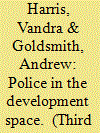

|
|
|
|
|
| Publication |
2012.
|
| Summary/Abstract |
International police now contribute the second largest proportion of personnel to peacekeeping missions after militaries. They are thus key contributors to post-conflict transitions in developing countries. In the past decade Australian police have played a major role in a range of international missions in the Asia-Pacific region, partially funded by Australia's international development budget. Increasingly the Australian Federal Police, as Australia's lead agency in this area, has explicitly adopted the development language of capacity building to describe a significant part of their role. This paper considers the contribution of Australian police to building or developing the capacity of new and/or re-formed police forces following conflict. It also examines the degree to which international police missions are able to contribute to broader development goals and achievements within these settings. In doing so, it engages with the question of 'outsiders' (non-development professionals) performing development work in the increasingly populated space of post-conflict recovery and reconstruction.
|
|
|
|
|
|
|
|
|
|
|
|
|
|
|
|
| 9 |
ID:
123519
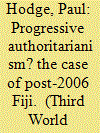

|
|
|
|
|
| Publication |
2012.
|
| Summary/Abstract |
Post-development has matured well beyond the romanticism and celebration of the local of its early proponents. The new 'conditions of possibility' that embody the latest contributions to the field are studies in governmentality. This paper explores the heterogeneous postcolonial spaces of post-2006 Fiji by deploying a Foucauldian analysis of Bainimarama's government, particularly focusing on the formation of identities and the attributes of a 'normalised citizenry'. The analysis aims to help explain why the implementation of a liberal rationality, in the form of racial equality for socio-political change in the country, calls for citizens to be subjected to various arts of government-surveillance, physical and psychological violence and, in some cases, incarceration and torture. An understanding of this brutal and puzzling irony is found in Fiji's colonial legacies and the ongoing contestation over what constitutes a 'normalised citizenry' in the country. I propose that Fiji's present contestations and anomalous coalescence of liberal rationalities and non-liberal means are best explained with reference to the paradoxical notion of progressive authoritarian governmentality.
|
|
|
|
|
|
|
|
|
|
|
|
|
|
|
|
| 10 |
ID:
123515
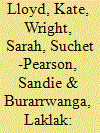

|
|
|
|
|
| Publication |
2012.
|
| Summary/Abstract |
This paper draws on the collaborative experiences of three female academics and three generations of Yol?u women from an Aboriginal family from Bawaka, North East Arnhem Land to contribute to debates in development around participation, power and justice. Through a reflection on the process of collaboratively co-authoring two books and associated outputs, the paper discusses the way the collaboration is guided by collective priorities that are held as paramount: trust, reciprocity, relationships and sharing goals. The paper draws particular attention to the essential role that families and non-human agents play in shaping these priorities. The relational ontology which underlies this collaboration is inspired by a Yol?u ontology of connection that requires us to acknowledge ourselves as connected to each other, to other people and to other things. Guided by this Indigenous ontological framework, we reframe the concept of collaboration and of development as inherently and always relational.
|
|
|
|
|
|
|
|
|
|
|
|
|
|
|
|
| 11 |
ID:
123513
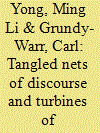

|
|
|
|
|
| Publication |
2012.
|
| Summary/Abstract |
Hydropower development on the mainstream of the Mekong River in the Lower Mekong Basin (lmb) has become one of the most pressing issues on the development agenda, being touted as the way forward in solving energy, development and sustainability needs in the region. Despite dominant and compelling arguments in favour of such development, a growing anti-dam lobby has taken to arguing that hydropower development will threaten the economic, social, environmental and food security of some 62 million people living in the lmb. The anti-dam lobby comprises a heterogeneous assemblage of actors, agencies and networks, working to provide critical and alternative geographical (re)imaginations of the lmb. This paper explores these multiple perspectives afforded by the anti-dam lobby through the lens of knowledge production. The anti-dam lobby, it will be seen, engages in a politics of legitimacy and re-scaling with the pro-hydropower lobby, played out through varying strategies, while highlighting urgent and critical knowledge gaps which need to be taken seriously for future development in the lmb.
|
|
|
|
|
|
|
|
|
|
|
|
|
|
|
|
|
|
|
|
|